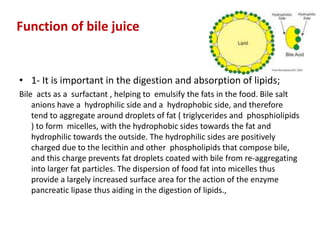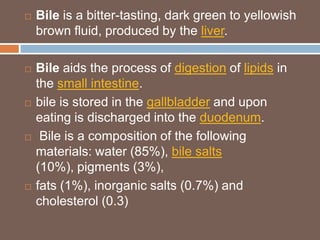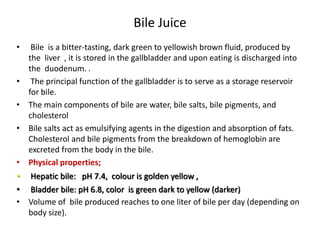Describe the Role of Bile in Digestion
Bile is formed in the liver and it is stored in the gallbladder or released directly into the small intestine. The livers major role in digestion is to produce bile.

The Importance Of Bile In Digestion
The enzyme pepsin plays an important role in the digestion of proteins by breaking them down into peptides.

. 200800 mg daily in humans escapes this enterohepatic circulation and enters the colon. It provides leadership in scientific. Upon ingestion of a meal bile acids stored in the gall bladder are secreted into the small intestine to facilitate lipid digestion and absorption.
This video covers the structure and function of the heart the double circulatory system the associated blood vessels pacemaker cells and the coronary arte. The bile produced in the liver is essential for the digestion of fats. The sympathetic and parasympathetic nervous systems are both parts of the autonomic nervous system and even though they are in charge of the same body functions they make opposite things.
This increases its potency and intensifies its effect in digesting fats. While the majority of bile acids are actively absorbed in the distal ileum and recycled back to the liver a small fraction 15. It comprises organic molecules such as bile acids slats bilirubin and cholesterol and water.
After being stored in the gallbladder the bile becomes more concentrated than when it left the liver. Bile plays a role in the breakdown of fats and more specifically is defined as a yellowish-green fluid that aids in the emulsification of fats. When food digestion is not occurring bile backs up the cystic duct and enters the gallbladder to be stored.
This is a greenish-yellow fluid that is composed primarily of bile acids but also contains cholesterol phospholipids and the pigments bilirubin and biliverdin. Laparoscopic cholecystectomy is a minimally invasive surgical procedure for removal of a diseased gallbladder. The liver also processes the absorbed vitamins and fatty acids and synthesizes many plasma proteins.
Bile aids in the digestion of lipids primarily triglycerides through emulsification. Describe the process of ingestion and its role in the digestive system. The liver produces bile a digestive juice that is required for the breakdown of fats in the duodenum.
This technique essentially has replaced the open technique for routine cholecystectomies since the early 1990s1. The liver is the largest internal organ in humans and it plays an important role in digestion of fats and detoxifying blood. At this time laparoscopic cholecystectomy is indicated for the treatment of cholecystitis acutechronic symptomatic cholelithiasis biliary.
Physiology of the Digestive System Specifically the digestive system takes in food ingests it breaks it down physically and chemically into nutrient molecules digests it and absorbs the nutrients into the bloodstream then it rids the body of indigestible. A11Bile is a dark yellowish-green or brown colour fluid produced by the liver and stored within the gallbladder. The two primary bile acids are chenodeoxycholic acid and cholic acid.
Bile acids are synthesized from cholesterol. Q11What are the functions of bile. It plays a vital role in the digestion of fats metabolism of carbohydrates and formation of bile.
This section was switched in the order in the chapter with the section now behind it. The liver pancreas and gallbladder Figure 2351 EDITORS NOTE. Describe how the secretion and release of bile and pancreatic juice is controlled Chemical digestion in the small intestine relies on the activities of three accessory digestive organs.
The American Dairy Science Association ADSA is an international organization of educators scientists and industry representatives who are committed to advancing the dairy industry and keenly aware of the vital role the dairy sciences play in fulfilling the economic nutritive and health requirements of the worlds population.


No comments for "Describe the Role of Bile in Digestion"
Post a Comment